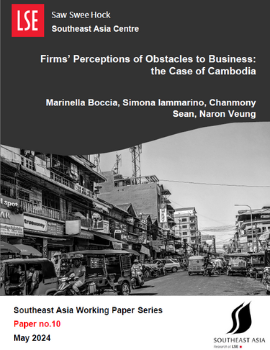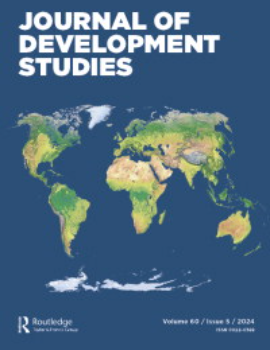
Bridging the Gap: An Examination of Teacher Deployment in Cambodian Preschools
The current study examines teacher deployment strategies in Cambodian preschools and identifies challenges related to the supply and deployment of teaching staff in early childhood education by assessing the adequacy, efficiency, and quality of teacher deployment. This study employs multiple approaches in data collection, including desk review of e...

Disentangling Community-Based Resource Governance Through Knowledge Systems Mapping: Insights from Community Fish Refuges In Rural Cambodia
Inland fisheries in Cambodia are of great importance to the livelihoods of rural communities, as they provide sustenance and seasonal income for the local population. Community fish refuges (CFRs) are natural or human-made water bodies that hold water throughout the year, providing a dry-season sanctuary for aquatic life. Managed mainly by the loca...

Maximizing Nutrition and Cost-Effectiveness: Sustainable Strategies for School Feeding and Gardening for Greater Impact in Cambodian Schoolchildren
This policy brief evaluates the cost-effectiveness, nutritional adequacy, and sustainability of Cambodia's three School Feeding Program (SFP) modalities: state-run, WFP-run, and school-gardening programs. Data from the 2022-2023 school year revealed disparities in implementation. The state-run model was the most cost-efficient, spending USD 38.9 pe...

Assessment Study: The Economic Cost of Integrated School Gardening in School Feeding Program
This study evaluates the economic and nutritional impacts of integrating school-grown gardens into Cambodia’s school meals program during the 2022-2023 academic year, using a mixed-methods approach. State-run schools were the most cost-efficient, with an annual cost of USD 38.90 per student, compared to USD 55.24 in WFP-run schools due to higher in...

Cost-Nutrition Assessment Guideline of School Feeding Program
The “Cost-Nutrition Assessment Guideline for School Feeding Program in Cambodia” utilizes a modified SEEM (Scope, Economic Components, Evaluation, and Measurement) framework to evaluate the cost-effectiveness, sustainability, and nutritional impact of decentralized school feeding programs. The framework assesses program boundaries, resource allocat...

Examining Student Enrolment Patterns: Case of Lower Secondary School in Siem Reap, Cambodia
This chapter examines the grade progress of students in Cambodia, where the government has made significant efforts in the past few decades to ensure equal access to basic education and has achieved remarkable success in expanding primary education. This study employs a cohort method approach that combines a student enrolment record analysis over s...

Climate‑related Loss and Damage in Contexts of Agrarian Change: Differentiated Sense of Loss from Extreme Weather Events in Northeast Cambodia
The uneven burden of climate-related losses and damages and its implications for equity and social justice are receiving growing attention in science and policy. Smallholder farmers, indigenous groups, and ethnic minorities are often identifed as particularly vulnerable and likely to experience a greater burden of climate-related loss and damag...

The Emergence of Training Programmes for the Garment Industry: Analysing the Cases of Bangladesh, Cambodia and Sri Lanka from a Historical‐Institution...
This study analyses industry‐specific training programmes catering to the garment industry in Bangladesh, Cambodia and Sri Lanka. Employing a historical‐institutionalist perspective and using mainly qualitative data, it focuses on programmes that are considered particularly relevant by the industry and discuss their characteristics as well as f...

Firms’ Perceptions of Obstacles to Business: The Case of Cambodia
This paper explores the factors affecting firms’ perception on how important barriers to innovation are in the case of Cambodia. In particular, the study aims to bring the characteristics of Cambodian enterprises to the fore, shedding light on two issues: what the characteristics associated with firm’s perceptions of barriers to their economic an...

Changing Effects of Birth Order on Education Over Time: Evidence from Cambodia
Despite the vast literature on birth-order effects in developing countries, there has been little research on their long-term changes. This study uses three population censuses of Cambodia to investigate how birth order affects educational attainments and how its effects changed over time. We estimate regressions with family fixed effects and cohor...
